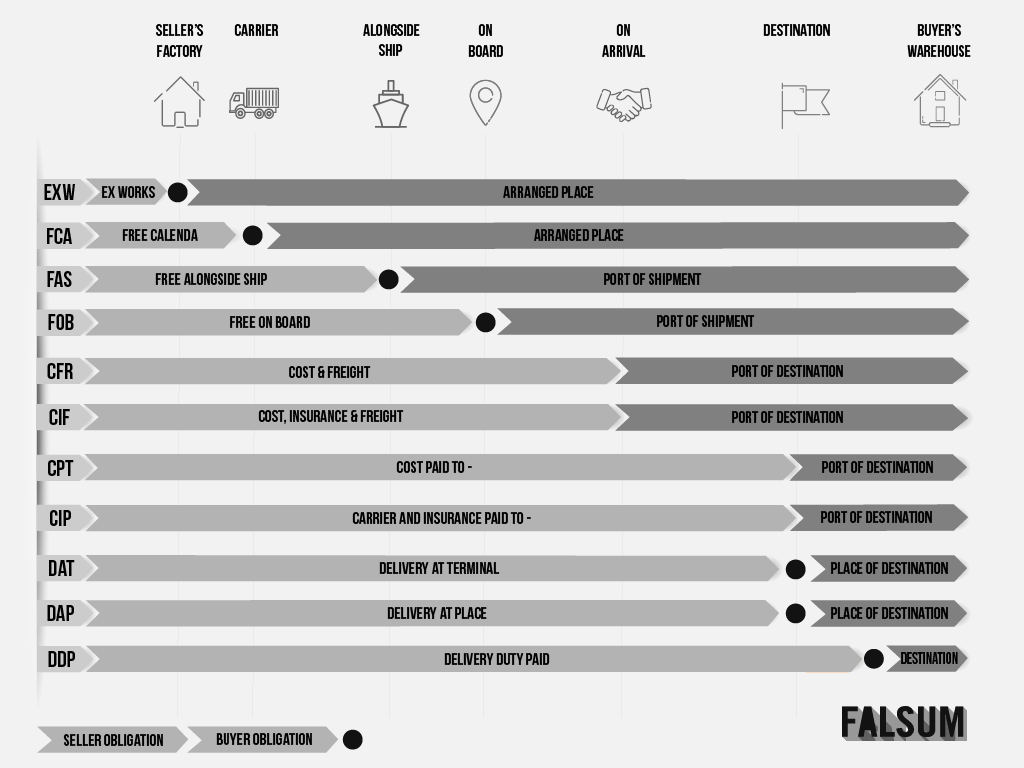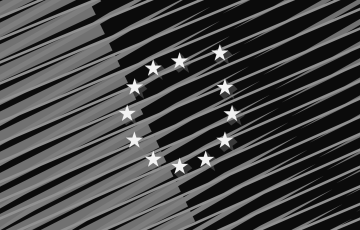Incoterms is an abbreviation of ‘International Commercial Terms’. They are terms that represent a universal and easily understandable method of communication between importers and exporters in countries around the world.
Incoterms define the responsibilities and obligations of the buyer and seller in a transaction so both parties understand the costs, the risks and the tasks they are responsible for.
On 1 January, 2020, a new set of Incoterms came into effect. In this glossary, we provide a description of each term, including those that have recently been updated or introduced.
Incoterms explained
FAS (FREE ALONGSIDE SHIP)
The seller is responsible for placing the goods to be exported alongside the ship at the named port, as well as arranging export documentation and clearing export customs. The risk for the loss or damage of those goods then passes to the buyer, who also bears all of the costs from that moment on. This Incoterm should apply to conventional sea freight only, not containerised cargo.
EXW (EX WORKS)
The seller is only responsible for making the goods ready for collection at a named premises, which could be their warehouse or another named location. The buyer is then responsible for the shipment from that point, including loading the goods, export documentation and clearance, payment of transportation costs, and movement of goods to the final destination.
The ICC has recommended that EXW only be used for domestic trade as it is difficult for an overseas buyer to complete export documentation in the country of supply. For overseas trade, FCA (Free Carrier) Seller’s Premises should be used instead of EXW.
FCA (FREE CARRIER) SELLER’S PREMISES
As outlined above, this term should be used instead of EXW (Ex Works), which is widely misused for exports. Under this term, the seller bears all risks and costs up to and including loading the goods onto the vehicle at their premises. The seller also has an obligation to arrange export documentation and clear export customs. If used for ocean freight, the seller can obtain a bill of lading.
FCA (FREE CARRIER) NAMED PLACE
The seller pays the transport costs within their own country up to unloading at a named place, while also having responsibility for export documentation and customs procedures. A bill of lading can be obtained by the seller for ocean freight. This term can be used for all modes of transport, and the ICC recommends that it replaces FOB (Free on Board) when goods are not being moved by conventional sea freight.
FOB (FREE ON BOARD)
The seller is responsible for loading the goods on board the vessel that has been nominated by the buyer, and also bears responsibility for export and customs duties. Once the goods are on board the ship, the cost and risk for the goods are divided between the two parties. The ICC advises that FOB should only be used for conventional sea freight, with FCA Named Place used for all other modes of transport, including containerised sea freight.
CFR (COST AND FREIGHT)
The seller pays the costs and freight for transporting the goods to the named destination port. However, the risk is transferred to the buyer once the goods have been loaded onto the ship. According to the ICC, this term should only be used for conventional sea freight. It isn’t appropriate for containerised cargo, which is better covered by CPT (Carriage Paid To).
CPT (CARRIAGE PAID TO)
The seller is responsible for loading the goods on the vessel chosen by the buyer, clearing the goods for export at the port/airport of loading, and paying freight costs to the named destination. The risk passes to the buyer once the goods are loaded on the first carrier.
CPT can be used for any means of transport and should replace CFR when shipping containerised cargo (as outlined above).
CIF (COST, INSURANCE & FREIGHT)
Just as the above, except in this case, the seller is also responsible for arranging and paying for the insurance. Incoterms 2020 states that CIF comes with the basic level of insurance, classed as “Clause C”, and should only be used for conventional sea freight.
CIP (CARRIER AND INSURANCE PAID)
The seller pays for the carriage and insurance to the named destination port, clears the goods for export at the port or airport of loading, and arranges insurance to a minimum of “Clause A”. CIP can be used for any means of transport, but the risk passes to the buyer when the goods are handed to the first carrier.
DDP (DELIVERED DUTY PAID)
The seller is responsible for all the costs and risks associated with delivering the goods to the named destination in the country of the buyer, including import duties and taxes. The buyer’s only responsibility is unloading the goods. While Ex Works (EWX) represents the minimum obligation for the seller, DDP represents the maximum obligation for the seller. It’s worth noting that DDP trade is not always possible in certain countries.
DAP (DELIVERED AT PLACE) ARRIVAL POINT
The buyer is responsible for import customs clearance plus any local taxes and import duties, with the seller responsible for arranging and delivering the goods to a named destination, which might be a port or airport in the buyer’s country. However, the seller is not responsible for unloading the goods at the named place.
DAP (DELIVERED AT PLACE) BUYER’S PREMISES
The seller bears the cost, risk and responsibility for goods until they arrive at the buyer’s premises in the country of destination, but not unloading the goods from the delivering transport. The buyer is responsible for import customs clearance and the payment of import duties/taxes, with the seller responsible for export clearance. The seller has the option to revert to DAP Arrival Point if import formalities are not completed in a reasonable time.
DPU (DELIVERED AT PLACE UNLOADED)
Under this term, the seller bears the cost, risk and responsibility until the goods are unloaded at a named place. The named place can be an air cargo depot, quay, container port, rail port, warehouse or any agreed place between both parties. This is the only term that requires the seller to unload the goods, but customs clearance is still the responsibility of the buyer.
This term was previously named Delivered at Terminal (DAT), but was changed for Incoterms 2020 as buyers and sellers often want goods delivered somewhere other than a terminal.






